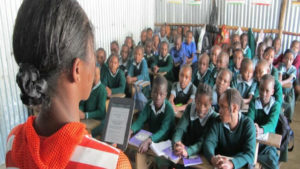Home » Commentary » Opinion » Unions ramp up attack on private schools for poor
· Ideas@TheCentre

 In his extraordinary 2009 book The Beautiful Tree, James Tooley revealed how low-cost private schools were providing education to the poorest people in the world and changing their lives for the better.
In his extraordinary 2009 book The Beautiful Tree, James Tooley revealed how low-cost private schools were providing education to the poorest people in the world and changing their lives for the better.
This remains the case, but not everyone is happy about it — including the local teacher unions. Recently and inexplicably, teachers unions in the UK and Australia have also started protesting against private schools for the poor in Africa, claiming they entrench inequality.
Private schools in developing countries are almost all small family businesses, located in city slums where public schools are crowded and inadequate, or in isolated villages where there is no public school. Very poor families willingly pay a small but significant proportion of their income so their children can have a decent education.
Some private education in developing countries is delivered in school chains run by corporations. The largest of these is Bridge International Academies, which gives teachers centrally-developed lesson plans and resources based on the national curriculum. This is a huge advantage in places where state-accredited teachers are difficult to come by, or are restricted from teaching in private schools. Thanks to funding from private investors and governments in developed countries, these schools are also affordably priced.
It sounds like an efficient way to provide education to the estimated 600 million children in developing countries who would otherwise miss out, doesn’t it?
Not according to organisations ideologically opposed to private schools — even if it means children go without an education. Education International, an international federation of teachers unions, is backing the claims of Kenyan teachers’ unions that Bridge schools provide substandard education in unsafe conditions, despite there being no proof of this, even in EI’s commissioned report. In solidarity, the UK National Union of Teachers has held protest rallies against foreign aid supporting Bridge schools.
Bridge International Academies opened its first school in Kenya 10 years ago and now has 600 schools in five countries. Like most low-cost private schools, its students achieve academic results higher than the national average (with lower per-pupil expenditure).
But the most convincing evidence that the unions are wrong is that Bridge schools are schools of choice. Why would so many parents intentionally waste the little money they have? As Ellen Johnson Sirleaf, former president of Liberia said, “this distinction between public and private shouldn’t matter; a school’s outcomes should.”
Unions ramp up attack on private schools for poor